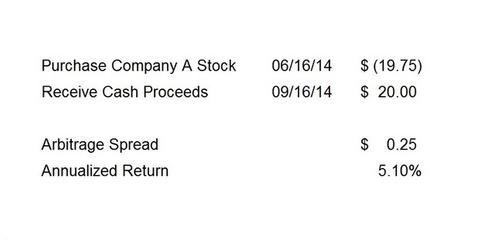Identifying and analyzing a typical cash merger arbitrage spread
What are the components of a risk arbitrage spread? There are a number of factors that figure into a trade. Let’s look at a typical cash deal first.
April 29 2015, Updated 4:54 p.m. ET

The typical cash risk arbitrage spread
What are the components of a risk arbitrage spread? There are a number of factors that figure into a trade. Let’s look at a typical cash deal first. If a company is being bought for $20 a share, how much would you pay for a stock to get that $20? The answer, of course, is “it depends.” Would you pay $20 a share? Probably not—unless you thought there was another company that was interested in buying the stock. As a general rule, mergers trade at a discount because there’s always the uncertainty that a deal will break (meaning the deal doesn’t get consummated for some reason). Mergers are almost always at a premium to the existing trading price of the stock. If the deal breaks, the stock will return to its pre-deal price (all things being equal). So the proper spread should take into account a number of important pieces of information, including the following.
- The probability of closing
- Hostile or friendly
- Cash tender or vote
- Strategic buyer or private equity
- The time it will take to close the deal
- The downside if the deal breaks
- Any dividends during the pendency of the deal
- The probability of a higher bid
- Tax implications of the deal
While there are other factors to consider, these are the main factors. Let’s take our typical cash deal, then. Suppose you wake up Monday morning to see in the Wall Street Journal that Company A is buying Company B for $20 a share. Company A’s stock closed at $15 on Friday. Can you buy it at $15 Monday morning? Of course not. It will probably be trading close to the deal price. The stock will be trading actively pre-market. Let’s say the stock is trading at $19.75 pre-market. You can buy the stock for $19.75 and get $20 when the deal closes. The arbitrage spread is 25 cents (assuming no dividends), and a typical deal closes in three months. So the rate of return is 25 / 19.75 = 1.26%, and since you’re getting that in three months, it works out to be just over 5% annualized.
Current deals
Right now, the biggest deals on Wall Street are between Time Warner (TWC) and Comcast (CMCSA) and between DirectTV (DTV) and AT&T (T). Investors who want to invest in M&A deals via an ETF should look at the IndexIQ ETF (MNA).
For access to premium risk arbitrage content, please email singh@marketrealist.com.
